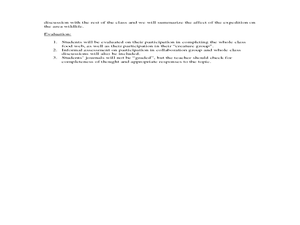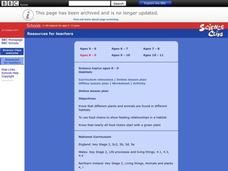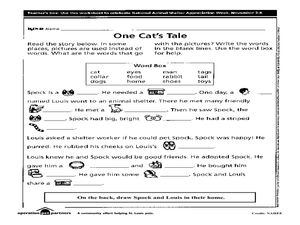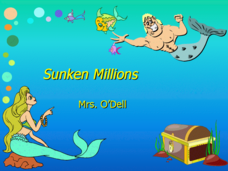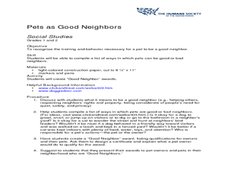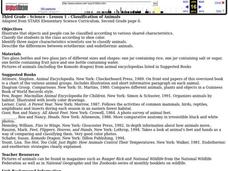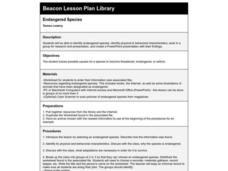Curated OER
Water: H2O = Life
For this earth science worksheet, students explore and describe animals and their adaptations, including their habitats, physical characteristics, and competing organisms. They also explore and describe how others use water around the...
Curated OER
Four Seasons
Students identify the change in the seasons. In this earth science instructional activity, students describe weather of each of the seasons and illustrate pictures of each season. Students discuss their illustrations with their classmates.
Curated OER
Animals and the Food Webs that Love Them
Students study the animals that Lewis and Clark would have encountered. In this animals lesson students study the food web and how human populations have affected them.
Curated OER
Soil Analysis Lesson Plan
Students practice calculating density and examine examples of the physical characteristics of soil. They solve a "crime" based on the evidence and laboratory investigations.
Curated OER
You Can Change the World
Students discuss ways they can help protect the environment. In groups, they examine various types of animals and identify their characteristics, food and habitats are compared. They create a Hyperstudio presentation in which they scan...
Curated OER
In Cell-A-Bration of Cells
Sixth graders identify major cell organelles found in both animal and plant cells. Pupils observe a PowerPoint presentation based upon the features of a haiku. They create haiku science-based poem which describe the characteristics of...
Curated OER
Finding Caterpillars
Students examine how animals protect themselves from predators and camouflage themselves. They participate in a simulation in which they locate red and green yarn "caterpillars," organize their data, and generate a bar graph using...
Curated OER
The Intertidal Zone
Learners research the diverse animal and plant life that inhabit the intertidal zones along the Pacific rocky coast. As students progress through this instructional activity, they begin to recognize distinct behaviors, adaptations, and...
Curated OER
Compare Animals
In this Venn diagram worksheet, students are asked to compare a dolphin's attributes with the characteristic of an animal of their choosing. Lines are given to write a short response about comparing the two animals.
Curated OER
Habitats
Students investigate the habitats of living things and the cycle of the food chain. In this scientific inquiry online lesson, students examine the habitats of plants and animals as well as the food chain as they sort pictures of living...
Curated OER
What is Manga?
Students research graphic novels. In this manga lesson, students work in small groups as the read graphic novels in literature circle format.
Curated OER
Fabulous Felines: How to Choose the Purrfect Cat
Students investigate the concept of pet care and cats. In this cat lesson, students discuss responsibilities for pet care and take a cat quiz. Students discuss where to get their cats and how to care for them. Students may visit an...
Curated OER
Sunken Millions
This PowerPoint provides a game show format with multiple choice questions about fresh and salt water. Topics include sources of water, water geography, uses of water, and the water cycle.
Curated OER
Inside-out Adaptations
Students describe sea stars adaptations and explain how these enable them to survive in different environments. In this animal adaptation lesson students watch a video, get into groups and create a list of characteristics of sea...
Curated OER
Pets as Good Neighbors
Young scholars investigate proper training techniques for pets by creating a list. In this domesticated animal lesson, students identify traits of a good neighbor and relate those traits to a pet. Young scholars create lists...
Curated OER
Mammal Study Merit Badge Workbook
In this Boy Scout Mammal Study merit badge worksheet, learners complete 5 pages of multiple step short answer questions associated with the characteristics of mammals in order to earn a merit badge. They list animal classification,...
Curated OER
Adaptations To the Environment
Students design and construct an imaginary animal that is perfectly adapted to a particular type of biome. They give the animal a scientific name, place it in a phylum and write descriptions about its behavior, reproduction, foraging,...
Curated OER
Who's There
Fifth graders, in groups, make a list of at least three animals that would survive well in a particular environment. After an allotted time, they pass their list to another group, where they will add to it. They discuss adaptations each...
Curated OER
Invertebrate Chordates
Most chordates are easy to identify because of the specific classification criteria of their phylum. But what about tunicates? Young scientists read a short explanation about why tunicates, or sea squirts, are considered to be members of...
Curated OER
Poriferans and Cnidarians
Students study the major phyla of the animal kingdom. In this biology lesson unit, students identify their general characteristics. They define taxonomy terminologies.
Curated OER
Animals Galore
Third graders use structural characteristics to sort and classify animals into groups.
Curated OER
Classification of Animals
Third graders practice classiyfying items and identify three major characteristics scientists use to classify animals. They describe the differences between ectothermic and endothermic animals.
Curated OER
Endangered Species
Students conduct Internet research on endangered species. They select an endangered species, identify its physical and behavioral characteristics, and create a Powerpoint presentation.
Curated OER
Creative Classification
Students create an animal by using physical characteristics to classify that animal in the Linnaean Classification System. This lesson plan is part of a multi-segmented unit on the diversity of life.
Other popular searches
- Characteristics of Animals
- 9 Characteristics of Animals
- Characteristics of Animalia
- Animals Characteristics
- Animal Phyla Characteristics
- Animal Plant Characteristics


